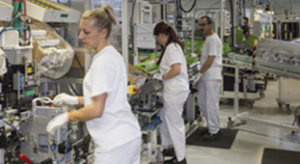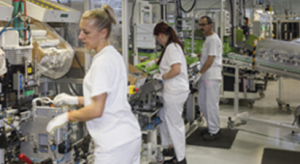
Job details
Location: Barrhead, AB
Salary: $27.85 per hour
Job type: Full Time , Part time
Shift/Hours: Morning, night, overnight
At Richardson International, being truly invested is at the heart of everything we do. For over 160 years, Richardson has been dedicated to Canadian agriculture. Recognized as a global leader in agriculture and food processing, Richardson is one of Canada’s Best Managed Companies and has more than 3,000 employees across Canada, the U.S. and the U.K.
Richardson Milling, a division of Richardson International, is the largest oat miller in North America and one of the leading oat millers in the world. Richardson has processing mills in the U.S., Canada and the U.K. and is proud to have the most extensive oat supply thanks to strong relationships with oat growers. At Richardson, we are committed to enhancing our facilities and services and supporting our communities.
Working with Richardson opens the door to a world of possibility. We currently have an opportunity for a Production Worker (Packaging Operator) at our Barrhead, Alberta location. This position is responsible for operating the packaging system to ensure finished products are packed, sealed, and prepared for shipping according to product specifications. The hourly rate for this position starts at $27.85
Responsibilities:
- Operate packaging equipment
- Operate forklift
- Perform minor repairs and troubleshooting activities on packaging equipment
- Provides sanitation services to all areas of the facility as assigned
- Accurately complete documentation for all processes
- Perform quality and food safety checks of finished goods and equipment
- Operates in accordance with all food safety, safety, and fire prevention regulations and practices
- Perform other duties as required
Qualifications:
- Grade 12 or equivalent
- Computer knowledge an asset
- Experience operating mobile equipment considered an asset
- Physically capable of lifting up to 50lbs
- Must be able to work well as part of a team
- Solid oral and written communication skills
Richardson International provides an excellent compensation package consisting of competitive salary, pension, a flexible benefits plan and training and career development opportunities.
Interested candidates should click the Apply icon to apply online by September 28, 2023.
Richardson International values diversity in the workplace. Women, Aboriginal People, Visible Minorities and persons with disabilities are encouraged to apply and self-identify.
What skills and qualities are important for a Production Packager?
A Production Packager plays a crucial role in preparing products for distribution by ensuring they are packaged, labeled, and organized correctly. This role requires attention to detail, efficiency, and adherence to quality standards. Here are important skills and qualities for a Production Packager:
1. Attention to Detail:
– Precise attention to detail is essential to ensure products are packaged accurately and according to specifications.
– Thoroughly checking labels, quantities, and packaging materials helps prevent errors and maintain product quality.
2. Manual Dexterity:
– Proficiency in handling packaging equipment, tools, and materials is vital for efficient and safe packaging processes.
– Good hand-eye coordination ensures products are packaged neatly and securely.
3. Time Management:
– Efficiently packaging products according to production schedules helps maintain workflow and meet distribution deadlines.
– Managing time effectively helps balance speed and accuracy.
4. Quality Control:
– Ensuring that products are packaged in a consistent and high-quality manner helps maintain the company’s reputation and customer satisfaction.
– Identifying defects, inconsistencies, or packaging errors is essential for preventing faulty products from reaching customers.
5. Organizational Skills:
– Properly organizing packaging materials, labeling, and finished products minimizes confusion and streamlines the packaging process.
– Being able to locate and access materials efficiently speeds up production.
6. Physical Stamina:
– Packaging work often involves repetitive motions and standing for extended periods. Physical endurance is important for maintaining productivity and avoiding fatigue.
7. Communication:
– Clear communication with supervisors and team members is important to ensure that packaging requirements and specifications are understood and met.
8. Problem-Solving:
– Being able to identify issues with packaging equipment, materials, or processes and finding solutions is essential for smooth operations.
9. Adaptability:
– Production packaging environments can experience changes in demand or product types. Being adaptable helps in transitioning between different packaging tasks effectively.
10. Health and Safety Awareness:
– Understanding and following safety protocols when using packaging equipment, handling materials, and working in the packaging area is crucial for personal safety and preventing accidents.
11. Teamwork:
– Collaboration with other team members, such as quality control personnel, supervisors, and machine operators, ensures a cohesive and efficient production process.
12. Basic Math Skills:
– Some packaging tasks may involve counting and basic measurements, so having a fundamental understanding of math is beneficial.
13. Attention to Hygiene:
– Maintaining cleanliness and hygiene when packaging products, especially in industries involving food or pharmaceuticals, is essential for product safety.
14. Positive Attitude:
– Having a positive attitude and a willingness to contribute to the team’s success creates a more pleasant work environment and promotes productivity.
15. Efficiency and Speed:
– While maintaining quality, being able to package products efficiently helps meet production targets and ensures timely delivery to customers.
A Production Packager’s role is pivotal in the production process, as they are responsible for ensuring that products are packaged correctly, efficiently, and to high quality standards before they reach consumers or clients.
Who can apply to this job?
The employer accepts applications from:
- Canadian citizens and permanent or temporary residents of Canada.
- Other candidates with or without a valid Canadian work permit.
How to apply
Online: Apply On Company WebSite
What education and certification are required to become a Production Packager?
Becoming a Production Packager typically does not require extensive formal education or certifications. However, certain skills and knowledge can enhance your qualifications for the role. Here are the common educational paths and certifications that can be beneficial:
Education:
- High School Diploma or Equivalent: Most Production Packager positions require a high school diploma or its equivalent. This provides a basic level of education and demonstrates essential skills in reading, writing, and basic math.
- Associate’s Degree or Technical Diploma: While not always required, obtaining an associate’s degree or a technical diploma in areas such as packaging technology, supply chain management, or a related field can provide a deeper understanding of packaging processes and materials. This could make you a more competitive candidate and potentially open doors for advancement within the industry.
Certifications:
Certifications are less common for Production Packager roles compared to other professions, but there are a few options that could enhance your qualifications:
- Certified Packaging Professional (CPP): Offered by the Institute of Packaging Professionals (IoPP), this certification is designed for packaging professionals and covers various aspects of packaging design, materials, regulations, and sustainability. While more relevant for packaging design and management roles, having this certification can showcase a commitment to the packaging field.
- OSHA Certification: While not specific to packaging, obtaining Occupational Safety and Health Administration (OSHA) certification can demonstrate your understanding of workplace safety regulations, which is important in a production environment.
- Forklift Operator Certification: If your role involves operating forklifts or other material handling equipment, obtaining a forklift operator certification can be necessary for safety and compliance reasons.
It’s important to note that while education and certifications can certainly enhance your qualifications, practical skills, work experience, and a strong work ethic are often equally if not more important for success in a Production Packager role. Many employers provide on-the-job training to ensure that employees understand specific packaging processes, equipment, and quality standards.
If you’re interested in pursuing a Production Packager role, you can start by looking for entry-level positions in manufacturing or production facilities. Tailoring your resume to highlight any relevant experience, skills, or coursework can help you stand out to potential employers.
What is the work environment like for Production Packager?
The work environment for a Production Packager can vary depending on the industry, the type of products being packaged, and the specific company’s practices. However, there are some common characteristics that you can expect in a typical work environment for a Production Packager:
1. Production Floor: Production Packagers primarily work on the production floor or in designated packaging areas. This is where they perform packaging tasks, such as assembling products, placing them in packaging materials, sealing containers, and applying labels.
2. Fast-Paced Atmosphere: Production packaging is often carried out in a fast-paced environment, especially in industries where high volumes of products need to be packaged quickly. Meeting production targets and deadlines is essential.
3. Repetitive Tasks: Packagers often engage in repetitive tasks, such as placing items in containers, sealing packages, or labeling products. The ability to maintain focus and attention to detail during repetitive tasks is crucial to ensure accurate and consistent packaging.
4. Shift Work: Many production facilities operate on multiple shifts to maintain continuous production. As a result, Production Packagers might need to work during various shifts, including evenings, nights, weekends, and holidays.
5. Team Collaboration: Packaging is often part of a larger production process, involving coordination with other team members. This could include communication with machine operators, quality control personnel, supervisors, and other members of the production team.
6. Safety Emphasis: Safety is a significant concern in a production environment. Adhering to safety protocols, using personal protective equipment (PPE), and following proper lifting techniques are essential to prevent accidents and injuries.
7. Equipment and Tools: Production Packagers use a variety of equipment and tools, such as sealing machines, labeling devices, scales, and hand tools. Familiarity with these tools and the ability to troubleshoot minor issues are important.
8. Quality Control: Ensuring that products are packaged correctly and meet quality standards is a critical aspect of the role. Production Packagers are responsible for identifying defects, inconsistencies, and packaging errors.
9. Physical Demands: Packaging work can be physically demanding, requiring standing for extended periods, bending, lifting, and repetitive motions. Maintaining physical stamina and using proper ergonomics is important for personal well-being.
10. Production Targets: Meeting production quotas and maintaining efficiency are common goals in production environments. Production Packagers contribute to achieving these targets through their accurate and efficient packaging work.
11. Cleanliness and Hygiene: In industries like food, pharmaceuticals, and cosmetics, maintaining cleanliness and adhering to hygiene standards during packaging is crucial to ensure product safety and compliance.
12. Temperature and Environment: Depending on the products being packaged, the work environment might have specific temperature or environmental requirements. For example, some products might need to be packaged in a controlled temperature setting.
13. Opportunities for Advancement: Many individuals start their careers as Production Packagers and can advance to roles with more responsibility, such as lead packagers, supervisors, or even positions in quality control or production management.
Overall, the work environment for Production Packagers is characterized by its fast-paced nature, focus on accuracy and quality, and the need for effective communication and teamwork within a production setting.



